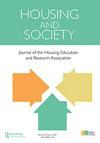The relationship between quality of housing and quality of life: evidence from permanent supportive housing
Q2 Social Sciences
引用次数: 2
Abstract
ABSTRACT State Medicaid expansion, coupled with financial incentives from alternative payment models, have fostered an increase in housing programs supported and implemented by hospitals and health systems. Permanent supportive housing (PSH) can improve patients’ health, quality of life (QOL) and wellbeing, and reduce healthcare costs over the long-run. Yet, there is limited research to understand the challenges and opportunities that arise, particularly with regards to housing quality, when stakeholders such as health plans decide to operate PSH programs. We describe a PSH program administered by a large Medicaid managed care plan, serving individuals experiencing homelessness with complex medical histories, and outline participants’ perceptions (n = 22) on the relationship between quality of housing and QOL – including physical health, mental health and social wellbeing. Findings indicate perceived improvements in physical, mental, and social aspects of QOL were attributed to housing stability, location, and quality. However, participants also highlighted stressors perceived to diminish QOL, particularly issues with the location and physical characteristics of the housing environment, challenging relationships with landlords and perceived discrimination. These results offer policy implications, including identifying roles for local and regional stakeholders to improve PSH programs by enhancing housing inspections, code enforcement, and prospectively tracking participant QOL.住房质量与生活质量的关系:来自永久性支持性住房的证据
摘要国家医疗补助计划的扩大,加上替代支付模式的财政激励,促进了医院和卫生系统支持和实施的住房计划的增加。永久性支持性住房(PSH)可以改善患者的健康、生活质量和幸福感,并从长远来看降低医疗成本。然而,当健康计划等利益相关者决定实施PSH计划时,了解出现的挑战和机遇的研究有限,特别是在住房质量方面。我们描述了一个由大型医疗补助管理的护理计划管理的PSH计划,该计划为有复杂病史的无家可归者提供服务,并概述了参与者(n=22)对住房质量和生活质量之间关系的看法,包括身体健康、心理健康和社会福利。研究结果表明,生活质量在身体、心理和社会方面的改善归因于住房的稳定性、位置和质量。然而,参与者也强调了被认为会降低生活质量的压力源,特别是住房环境的位置和物理特征、与房东的挑战性关系以及被认为的歧视等问题。这些结果提供了政策启示,包括确定地方和区域利益相关者的角色,通过加强住房检查、法规执行和前瞻性跟踪参与者的生活质量来改进PSH计划。
本文章由计算机程序翻译,如有差异,请以英文原文为准。
求助全文
约1分钟内获得全文
求助全文
来源期刊

Housing and Society
Social Sciences-Urban Studies
CiteScore
2.30
自引率
0.00%
发文量
10
期刊介绍:
Housing and Society is the journal of the Housing Education and Research Association (HERA). The journal supports the mission of HERA by providing for the dissemination of research and other scholarly work. Submissions from a broad range of perspectives are encouraged. Topics in housing include: policy, design, social aspects, gerontology, behavioral aspects, energy/environment, equipment, interiors, economics, theory/model development, education, and program development or evaluation. The journal welcomes the submission of original research articles, notes and commentaries. Notes are shorter manuscripts presenting succinct information on housing related to one of the following categories: - Research: exploratory or not heavily theory-based or statistically analyzed - Academic: innovative teaching ideas - Program: development, implementation, and/or evaluation of Cooperative Extension or other housing programming efforts - Policy: examination of policy impact, comparative analysis, and/or need to achieve housing goals - Reviews: books, documentaries, etc.
 求助内容:
求助内容: 应助结果提醒方式:
应助结果提醒方式:


